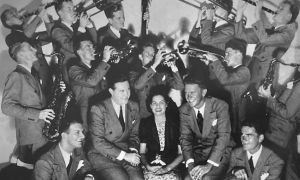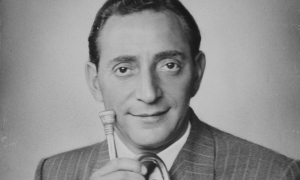Home » Jazz Articles » History of Jazz » Which Came First—Jazz or Baseball?
Which Came First—Jazz or Baseball?

That doesn't mean they're related, although a school of thought has developed that the word "jazz" originated as a baseball term. The genesis of this claim is an anonymous April 2, 1912, story in the Los Angeles Times in which the term "jazz" was used to refer to a pitch thrown in a California minor league game. The term was picked up by Edward "Scoop" Gleeson, a sportswriter for the San Francisco Bulletin, and he began to use it frequently to mean "energetic" or "peppy."
This theory got a boost when a 2012 article in The Wall Street Journal ("How Baseball Gave Us Jazz" by Ben Zimmer) asserted that this first appearance of the word in print meant that the term "jazz" originated with baseball. While various leading etymological sources (the Oxford English Dictionary for example) have thrown up their hands and taken the position that the origin of the word "jazz" is unknown, we can know with certainty that it predates the sports pages of California in the early twentieth century.
Looking for the origin of a word in a newspaper is a bit like the drunk who loses his car keys and searches for them under the glare of a street light because it is easier to see there. In other words, the hunt for the roots of "jazz" that resulted in the baseball theory began in the wrong place because newspapers are a convenient place to look, but not the earliest. Among linguists—not sports or jazz experts—it is the consensus that speech is an innate human capability and that a written language cannot develop without a prior spoken one to record. But how else, the defender of the baseball theory asks, am I supposed to research the speech of musicians long dead?
The answer is oral histories, of which there are several recorded by reputable jazz scholars. There is, for example, the 1962 interview of George Morrison, born in Fayette, Missouri, in 1891 by jazz scholar Gunther Schuller. Morrison told Schuller that he first heard the word "jazz" to refer to post-ragtime music in 1911, which he remembered distinctly because he was married that year. He painted "George Morrison and His Jazz Orchestra" on both sides of his car to advertise the style of music that audiences were warming up to—not the sort of evidence one would find searching old newspapers. "All those old numbers," Morrison said, "like 'Darktown Strutters' Ball,'" were played by Morrison's band "pretty fast and lively... as a jazz number." There is the statement in an interview by Bill Russell and Richard Allen of New Orleans bassist Eddie Dawson, born in 1884, who said that the term was first used in local bands there around 1905. There is trumpeter Ray Lopez, who told Richard Hadlock that he first heard the word in the musical sense before 1912, when he was rehearsing at the Orpheum in New Orleans. And there is George Filhe, who told Rudi Blesh and Harriet Janis, authors of "They All Played Ragtime," that he played solo cornet in 1892 with the Cousto & Desdunes band, who he said "Played jazz, would always swing the music." As a matter of historical fact, the population of America moved from east to west, so one must ask the question, which is more likely to have occurred: that the word "jazz" would migrate from New Orleans westward, carried by musicians such as Jelly Roll Morton, who claimed to have invented jazz in 1902, and who traveled extensively in California? Or that a group of largely illiterate men and women in New Orleans would read a story in a newspaper published half a continent away and decide "We should name our music after that new baseball term from California."
The California newspaper theory ignores what should be another obvious historical fact; an African-American who applied for a job at a newspaper in the first years of the 20th century would not have been hired as a reporter or editor, or even been given a chance to submit a freelance article; the only position open to him would have been janitor. Thus there was no chance that a Black voice would bring the emerging musical form to the attention of its readers, and when a sportswriter heard it for the first time covering a game between two all-white teams, he would have no reason to think it wasn't original to baseball.
Much reliance has been placed on the disfavor that some African-American musicians, past and present, feel towards the use of the term "jazz" because of its possibly ribald origins; namely, that it is derived from "jism," a vulgar term for semen, and variations upon that root such as "jiss" or "jiz." While I view what we call "jazz" as American classical music and am understandably sympathetic to those of like mind, that doesn't detract from the possibility that this is in fact the better origin theory. Jelly Roll Morton, born around 1890, was playing the music he called jazz in a New Orleans bordello at the age of 14, which would have been 1904. (On his 1918 World War I draft card Morton said he was born in 1884, but this was a common ruse to avoid conscription; the older one was, the sooner one was ineligible to be called up.) Morton's time spent playing in New Orleans whorehouses is well-documented; in his interviews by Alan Lomax, he says he was hired first as a "can-rusher" (errand boy) in Mamie Desdune's bordello, learned to play the blues, then worked his way up to "Professor" playing the piano. He describes peeking through a screen at the naked women who danced to the music that he played, as memorably recalled in his composition "The Naked Dance." The association of music with eros dates back at least to ancient Greece—it is discussed in Plato's Symposium—so the reluctance to make the connection in the modern era, while understandable, strikes one as a prim evasion.
The vulgar background of the term probably explains why so few early uses of it have been found in New Orleans newspapers prior to or contemporaneous with those in California. One California paper said "jazz" means "whatever you want it to," but that would not have been the case in New Orleans. In The City That Care Forgot, the word was understood as an obscenity, and wouldn't have been printed in a reputable newspaper. It wasn't until 1916, after the city of Chicago was credited by a New York theatrical journal "with having discovered a new form of music known as the 'jas band'" that the New Orleans Statesman responded that such bands "have flourished in the New Orleans tango belts, and have frequently been heard on the New Orleans streets prior to the advent of cabarets." The Statesman reported that "a big 'jas band' parade" was planned to reclaim New Orleans' rightful title as birthplace of jazz.
The baseball theory has gained such credence that it has been cited without criticism by knowledgeable jazz writers, among them the late Terry Teachout, author of excellent biographies of Louis Armstrong and Duke Ellington. The more recent proponents of the theory have overlooked a number of prior citations that undermine their argument, however. There is the article by press agent Walter Kingsley in the August 5, 1917, New York Sun in which he said that Lafcadio Hearn—who died in 1904—told him the word "jaz," meaning "to speed things up, to make excitement," was "common among the blacks of the South and had been adopted by the Creoles as a term to be applied to music of a rudimentary syncopated type."
Kingsley's account has been discounted because (among other reasons) no written record of this quote by Hearn has ever been found, but Kingsley didn't claim that Hearn put his observations in writing. Those who question the purported Hearn-Kingsley exchange must overcome several difficulties: first, you can't prove a negative, and Hearn was a prolific correspondent. While many of his letters were preserved and can be viewed either on-line or at the institutions where they are housed (and I have reviewed hundreds of them), there is no way of knowing whether these represent all of his correspondence, and no reason to think he would not have written such a letter to Kingsley. Second, Hearn was a serious musicologist who lived in New Orleans for nearly a decade, during which time he frequented the sort of after-hours venues where jazz was allegedly born. He wrote a lengthy treatise titled "'Negro Music of the Southern United States," and other writings of his reveal a sensitivity to the formative principles of the genre: "Did you ever hear the negroes play the piano by ear?" he wrote in 1881. "They use the piano exactly like a banjo." This observation recalls some latter-day jazz pianists such as Ahmad Jamal and McCoy Tyner, whose styles can accurately be described as "percussive" without conveying any invidious judgment. Finally, Hearn was not so famous in 1917 that Kingsley would benefit from making up a story about him in support of a rather minor point relative to his client Florenz Ziegfeld's musical "Midnight Frolic." You don't have to buy the whole Kingsley line of goods to recognize that the tone and the substance of the quote sounds like something Hearn would have said or written.
Turning back to old newspapers that the baseball scholars missed, one finds the term "jass" used to refer to a Swiss card game in a 1911 New Orleans Times-Democrat article, and as the surname of a man cut in a razor fight in an 1899 article in the same paper. There was even a horse named "Doctor Jass"—anticipating the Jelly Roll Morton song—in an 1891 New Orleans Times-Picayune article. Jazz seemed to be both in the air and on the printed page, as ubiquitous in New Orleans in the late 19th century as the word "cool" is to us today.
So sorry, baseball fans; history, linguistics, and logic are against you—three strikes and you're out.
Tags
Jazz in Long Form
Con Chapman
Jelly Roll Morton
New Orleans
Chicago
Louis Armstrong
duke ellington
Ahmad Jamal
McCoy Tyner
PREVIOUS / NEXT
Support All About Jazz
 All About Jazz has been a pillar of jazz since 1995, championing it as an art form and, more importantly, supporting the musicians who make it. Our enduring commitment has made "AAJ" one of the most culturally important websites of its kind, read by hundreds of thousands of fans, musicians and industry figures every month.
All About Jazz has been a pillar of jazz since 1995, championing it as an art form and, more importantly, supporting the musicians who make it. Our enduring commitment has made "AAJ" one of the most culturally important websites of its kind, read by hundreds of thousands of fans, musicians and industry figures every month.























